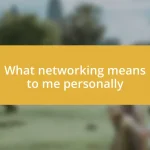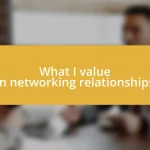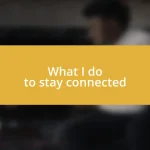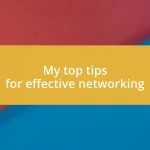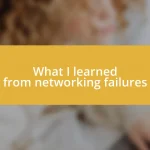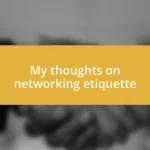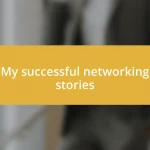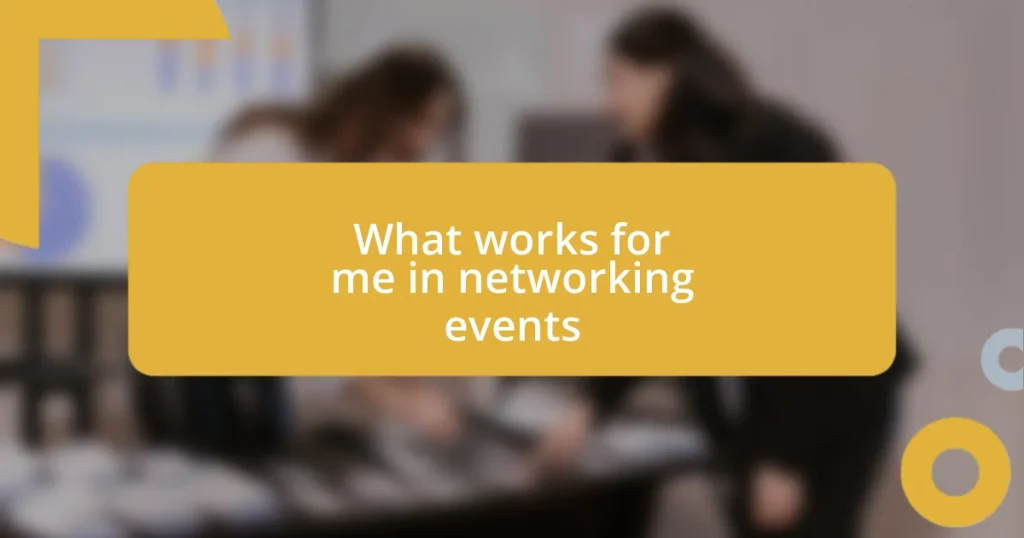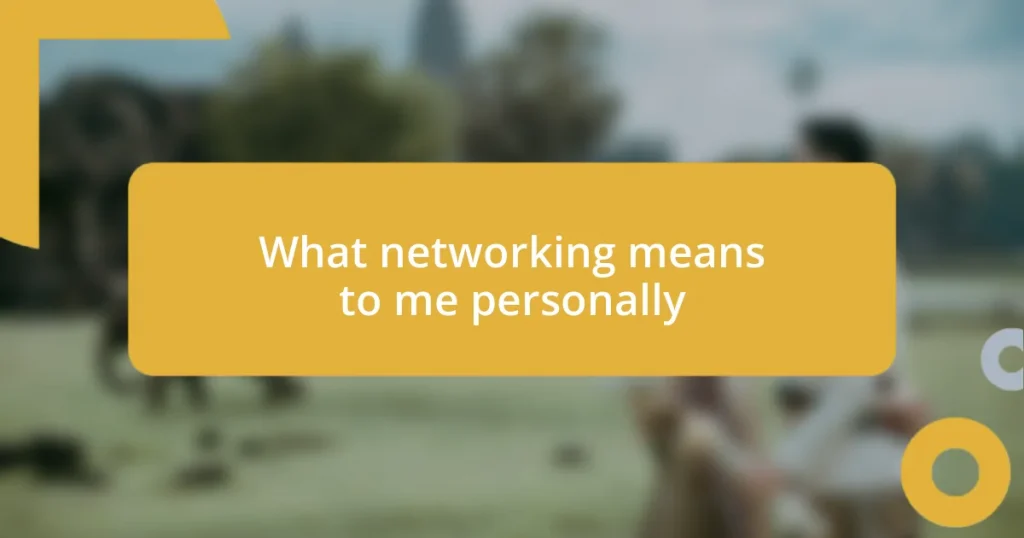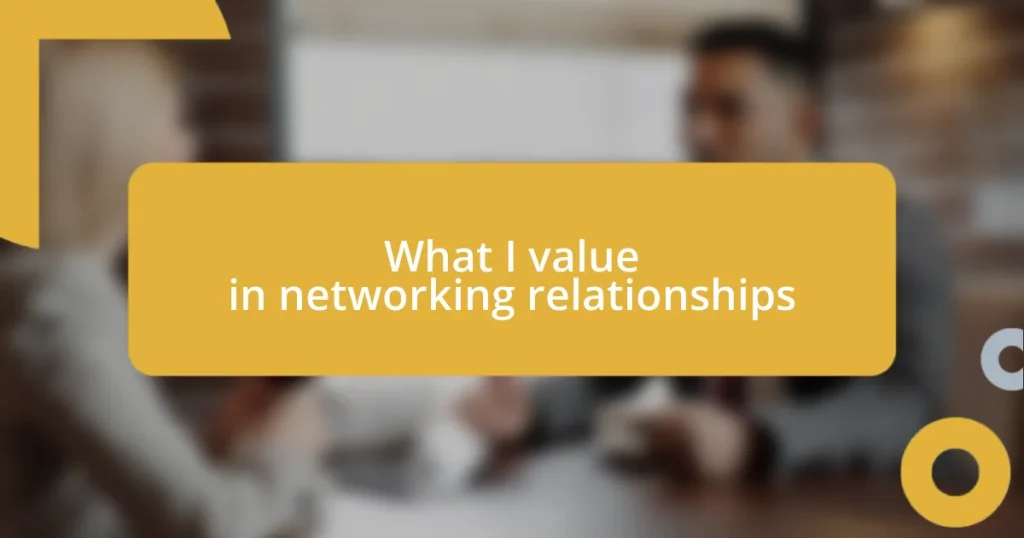Key takeaways:
- Genuine connections are built through friendly interactions and active listening, turning networking from transactional to relational.
- Effective preparation, including researching attendees and crafting open-ended questions, enhances networking success and reduces anxiety.
- Following up promptly with personalized messages and leveraging social media can transform fleeting introductions into lasting professional relationships.
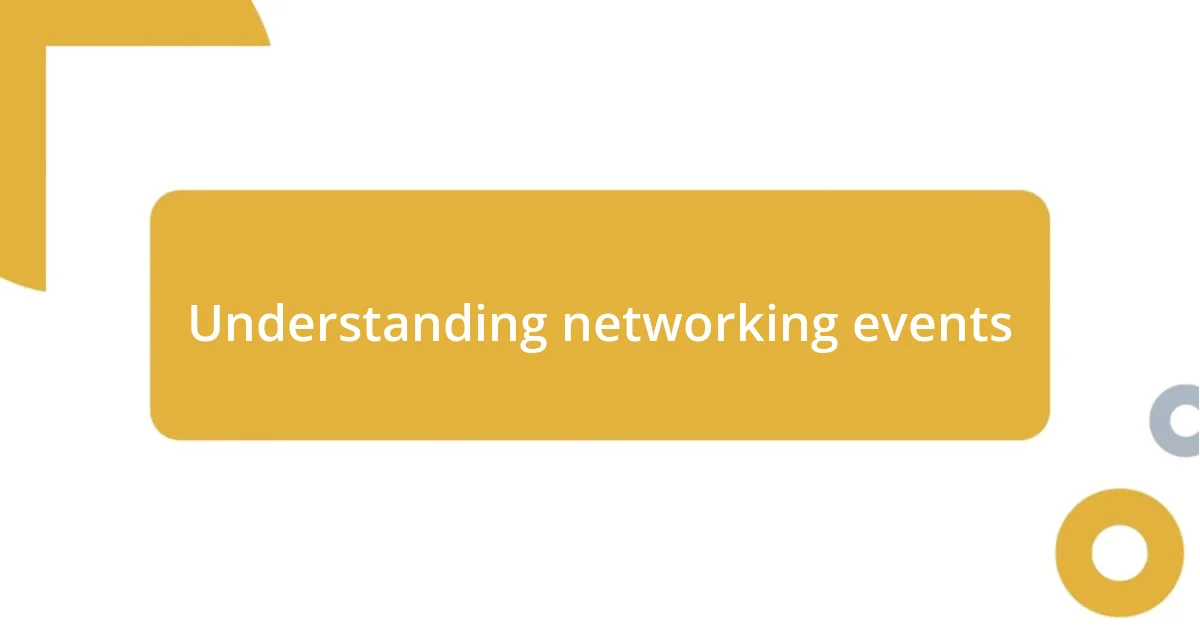
Understanding networking events
Networking events can feel overwhelming, especially if you’re stepping into one for the first time. I remember my initial experience vividly; the sheer number of people and conversations buzzing around me was both exciting and nerve-wracking. It made me question: how do you even start a meaningful interaction in such a lively atmosphere?
Understanding the dynamics of networking events is crucial. They aren’t just about exchanging business cards; they’re opportunities to build genuine connections. I’ve found that approaching someone with a friendly smile and a simple “What brings you here today?” often opens the door to deeper discussions. It seems like such a small thing, yet it shifts the interaction from transactional to relational.
Another key aspect I’ve noticed is the power of active listening. In one particularly memorable event, a fellow attendee shared her passion for sustainable fashion. I made a conscious effort to listen intently, asking follow-up questions. That conversation turned into a collaboration months later. Isn’t it fascinating how one focused dialogue can lead to unexpected opportunities?
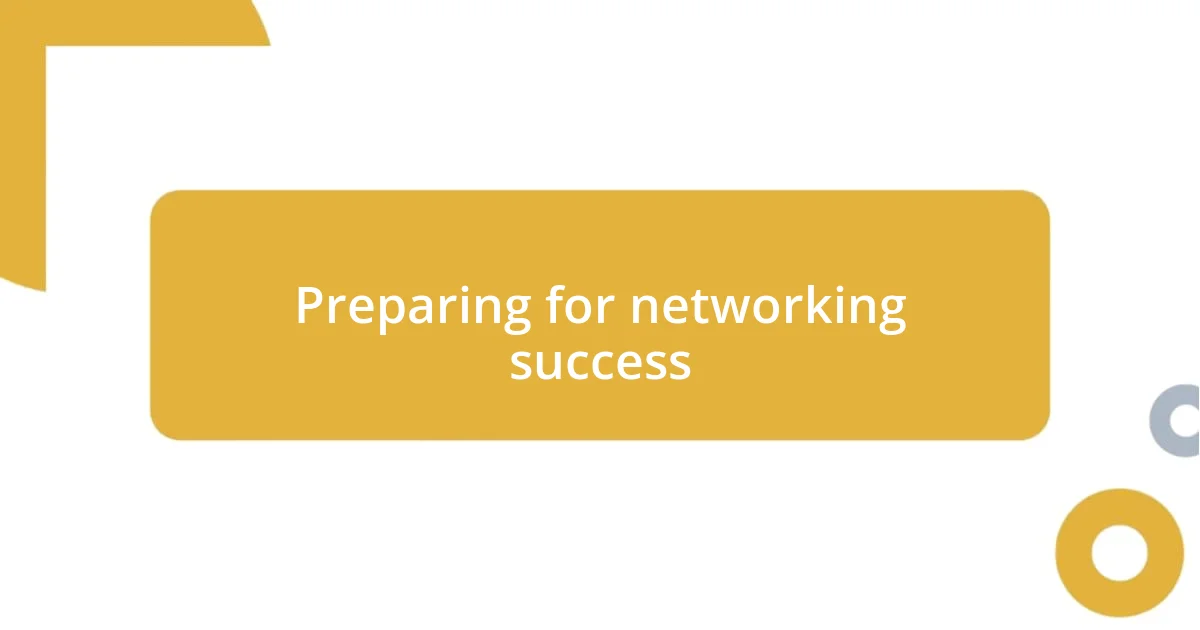
Preparing for networking success
Preparing for a networking event is not just about choosing the right outfit; it’s an opportunity to set a positive mindset. I often take a moment to visualize my goals before stepping into the event—who I want to meet and what I hope to achieve. This mental preparation creates a sense of purpose that helps ease my nerves. It reminds me that each conversation could lead to a meaningful connection.
Here are a few practical tips that have made a difference for me:
– Research attendees and speakers: Knowing who will be there helps tailor your conversations.
– Practice your elevator pitch: I rehearse my introduction so I feel confident; it keeps me from stumbling over my words.
– Prepare open-ended questions: I keep a few in mind to spark engaging dialogues.
– Plan your follow-ups: Having a system for keeping in touch after the event ensures I don’t lose valuable connections.
– Bring business cards: They remain handy for those spontaneous moments.
By preparing thoroughly, I can embrace the event’s energy and connect on a deeper level. It transforms networking from a chore into a rewarding experience.
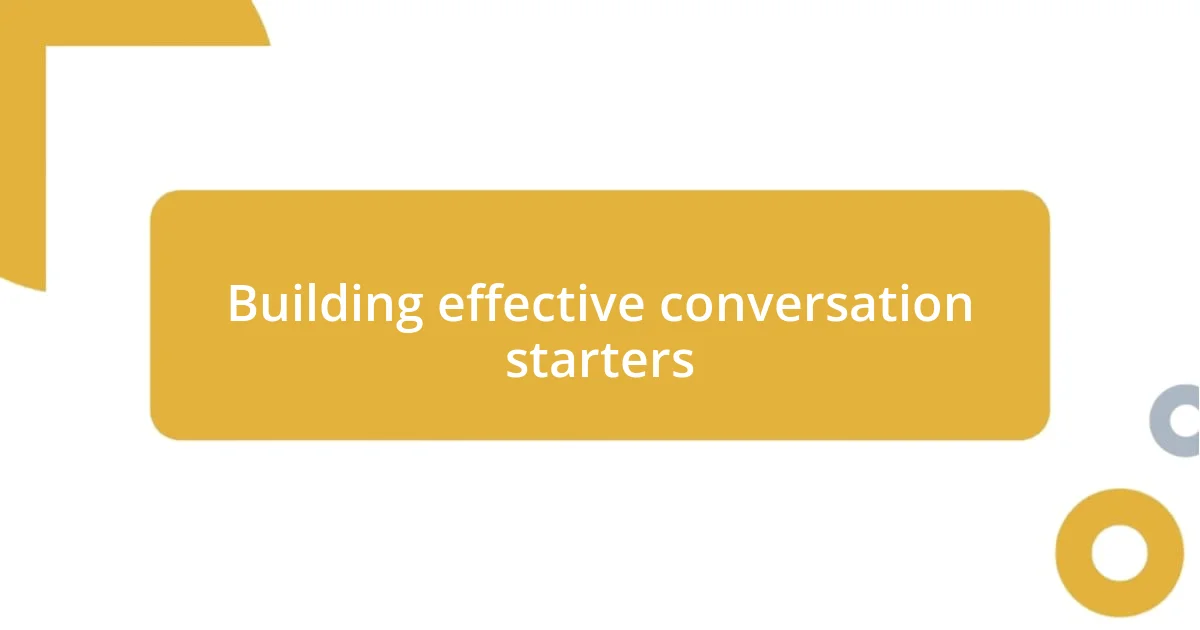
Building effective conversation starters
Building effective conversation starters is essential for navigating networking events with confidence. A memorable starter I’ve often used is asking about a recent project or challenge they’re facing. This not only shows genuine interest but also opens the door for more in-depth discussions. I recall asking an attendee about a new initiative at their company, and it led to an engaging exchange where we could share insights and advice.
Another tactic that works for me is to share personal experiences related to common interests or industry trends. For instance, during one event, I opened up about my own struggles with remote work and found that many people instantly related. This technique creates a bond and makes the conversation more relatable, enhancing our connection. It’s remarkable how vulnerability can foster stronger relationships.
Finally, sometimes a light-hearted approach can break the ice. I often ask about someone’s favorite movie or go-to song; it adds a playful tone to the conversation. One time, this led to a shared love for classic rock, sparking laughter and stories that kept the dialogue flowing effortlessly. It’s these unexpected links that can turn a mundane exchange into a memorable interaction.
| Conversation Starter Type | Purpose |
|---|---|
| Open-ended questions | Encourages in-depth discussions |
| Personal anecdotes | Creates relatable connections |
| Light-hearted topics | Fosters a relaxed environment |
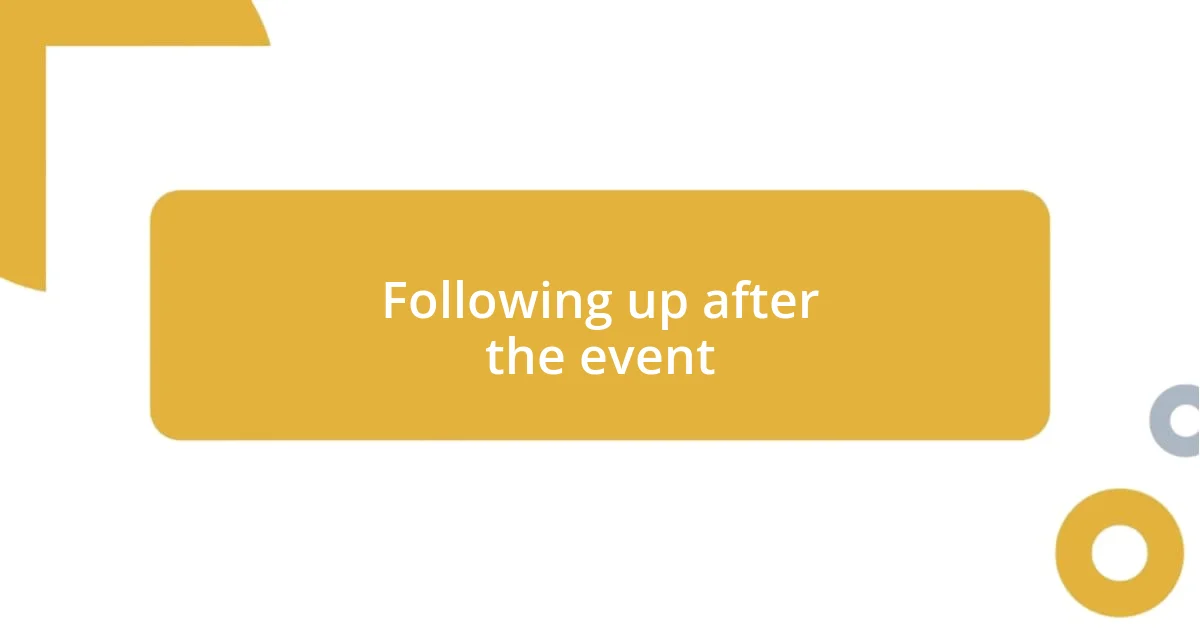
Following up after the event
After the networking event, one critical step is following up. I make it a point to send a personalized message within a day or two, reminding the person of our conversation. This action not only shows my genuine interest but also helps solidify the connection. Have you ever felt how a timely follow-up can make you stand out? I certainly have, especially when I was able to reconnect with someone who remembered me as “that enthusiastic person from the conference.”
In crafting my follow-up messages, I draw upon specific details from our chat. For example, if we discussed a book or a project, I might share a related article I found or ask for their thoughts on it. This creates a two-way dialogue that feels more engaging and ensures my messages don’t come off as generic. I remember exchanging notes on a mutual interest in emerging tech, and following up with a relevant podcast link led to several insightful exchanges thereafter. It transformed a fleeting moment into a budding professional relationship.
Moreover, I often look for opportunities to suggest a coffee chat or virtual meeting. This not only strengthens our bond but also opens the door for more in-depth conversations. I once suggested a quick Zoom call with someone I met at a workshop, and we ended up brainstorming ideas that turned into a collaborative project. It’s fascinating how a simple follow-up can turn a connection into a partnership. Are you ready to take that step with your new contacts? Trust me, those follow-up moments can lead to incredible opportunities.
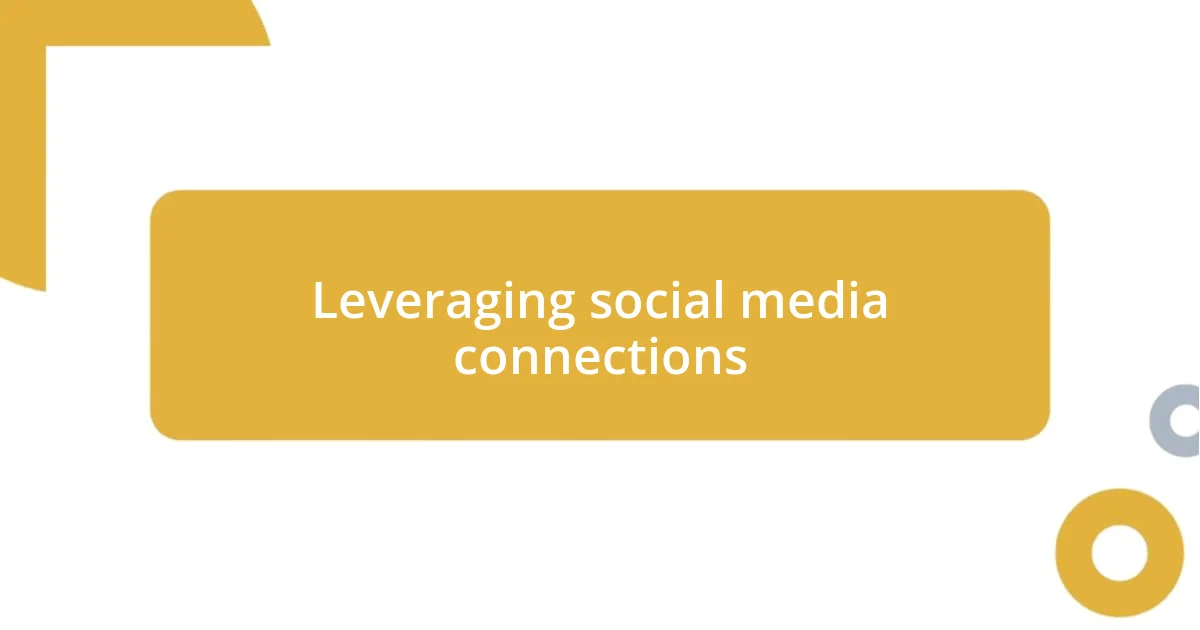
Leveraging social media connections
When it comes to leveraging social media connections, I find that platforms like LinkedIn are invaluable. I remember attending an industry conference and connecting with several people on LinkedIn afterward. A few weeks later, I noticed one of them posted about a challenge their company was facing. I commented with my thoughts, sparking a dialogue that not only deepened our connection but also led to a collaboration opportunity. Have you ever thought about how a simple comment can open doors you never expected?
Moreover, I often use social media to keep the conversation flowing between events. For instance, I follow up on shared interests by posting relevant articles or insights that I believe could benefit my connections. One time, I shared a piece on digital marketing trends, and it prompted one of my contacts to reach out. We eventually set up a meeting to discuss our strategies, which evolved into a mentorship relationship. It’s amazing how fostering these online interactions can enhance in-person engagements.
Additionally, I believe in the power of personalized messages on platforms like Instagram or Twitter. If I see someone posting about a project they’re passionate about, I send a direct message to express my appreciation and share my own thoughts. I once did this with a fellow attendee who was working on sustainability initiatives; our exchange turned into an ongoing conversation that led to collaborative efforts in our respective fields. Isn’t it fascinating how a few words on social media can cultivate meaningful connections?
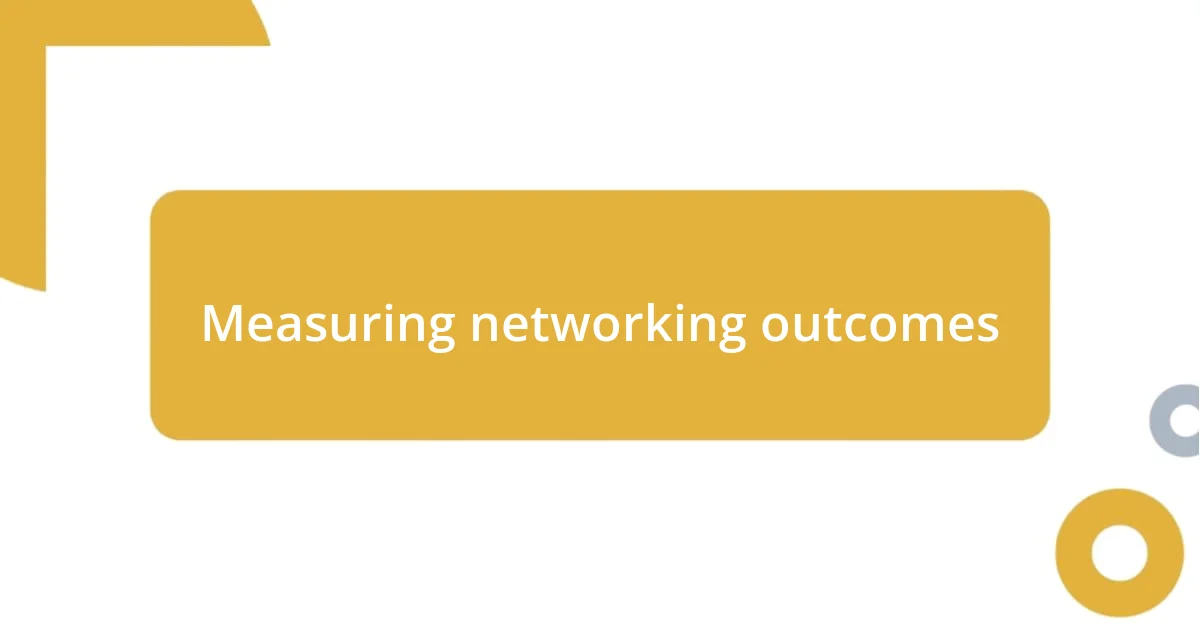
Measuring networking outcomes
Measuring the outcomes of networking events can sometimes feel daunting, but I’ve found a practical approach that helps to simplify the process. After each event, I jot down reflections on who I met and any valuable insights shared. This not only helps me track my connections but also highlights what resonated with me. Have you ever noticed how writing things down can illuminate what truly mattered during those interactions?
One of the most insightful measures for me has been to assess the quality of follow-ups from connections. I typically keep a simple checklist of responses to my messages, or if they engage with my shared content online. For instance, after a recent event, I reached out to someone about their recent project. Their enthusiastic reply made me realize just how impactful that conversation was, leading to a new project partnership. Has measuring responses ever made you rethink the importance of your networking in a different light?
Furthermore, reflecting on any collaborative opportunities that arise post-event offers invaluable insight. I vividly recall a situation where a casual chat led to brainstorming ideas on a joint venture, resulting in a successful initiative. It’s fascinating how a casual interaction can manifest into exciting opportunities when measured appropriately. Measuring outcomes isn’t just about numbers; it’s about recognizing trends and newfound possibilities. Have you set out to track your networking journey in such a way?
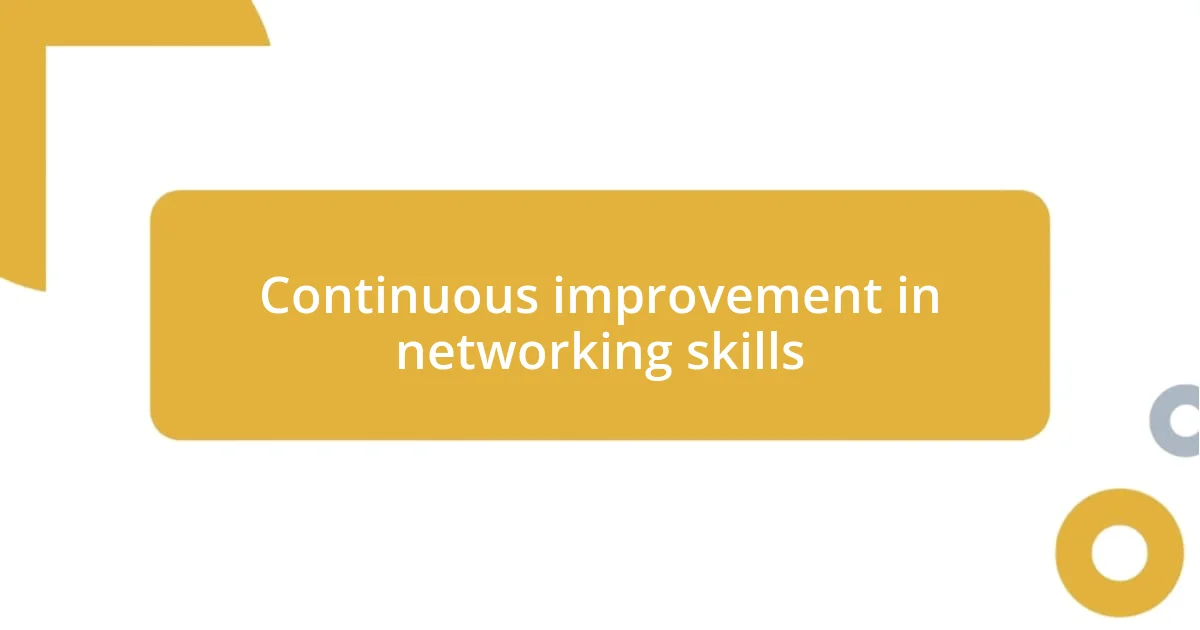
Continuous improvement in networking skills
Improving networking skills is an ongoing journey, and I’ve learned that practice makes all the difference. At every networking event, I try to implement one new technique, whether it’s mastering eye contact or practicing active listening. I still remember the awkwardness of my first attempts at these skills; looking back, I can’t believe how far I’ve come. Have you ever tried a new approach only to find it feels more natural than expected?
Another crucial element in my growth has been seeking feedback from peers. After an event, I often ask trusted colleagues about my interactions and how I come across. I once received a thoughtful critique that I interrupted too often during discussions, which was a revelation. It felt uncomfortable at first, but embracing that candid feedback transformed the way I engage. Isn’t it insightful how honest conversations can lead to personal breakthroughs?
Lastly, I make it a point to attend workshops focused on communication and networking techniques. These sessions not only refine my existing skills but also expose me to fresh perspectives. I remember a workshop where we practiced improvisational speaking; the experience boosted my confidence immensely. Why not challenge yourself with a similar opportunity? The growth that comes from pushing your boundaries can be incredibly rewarding.

